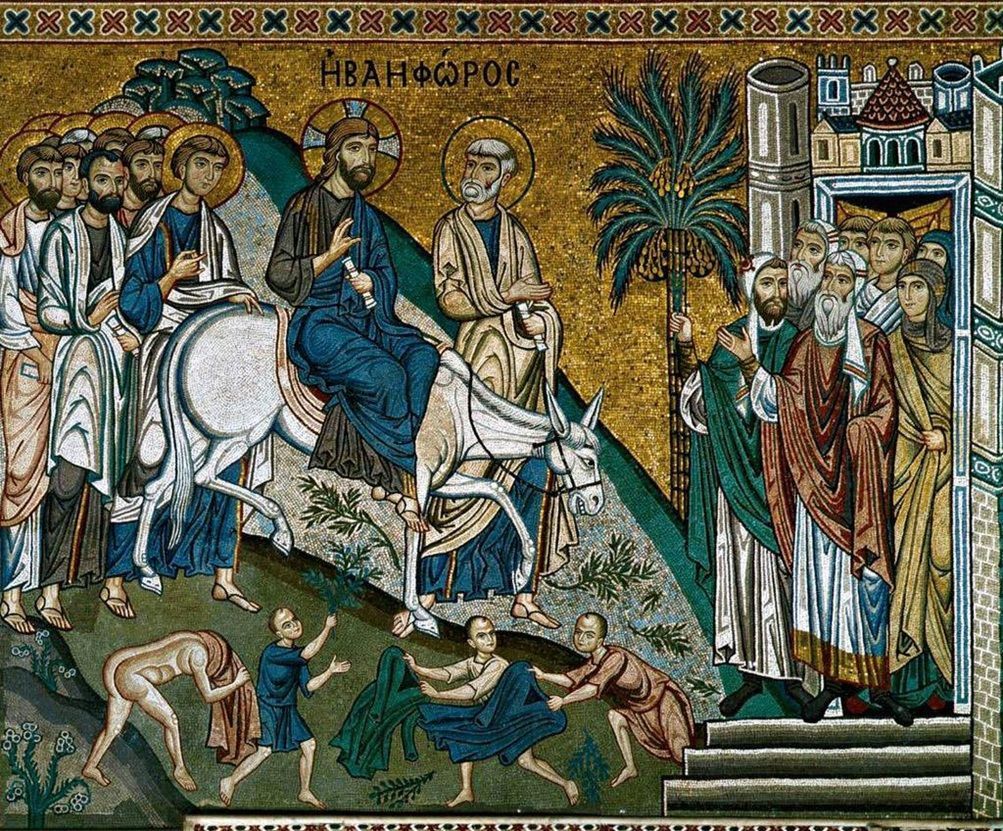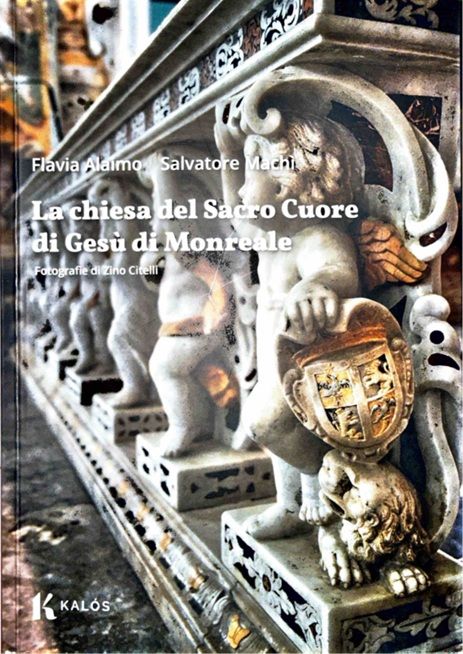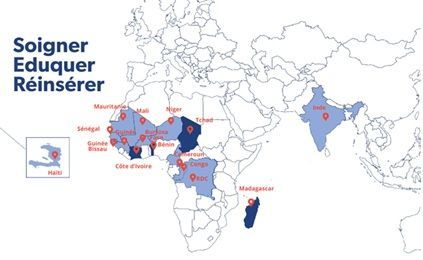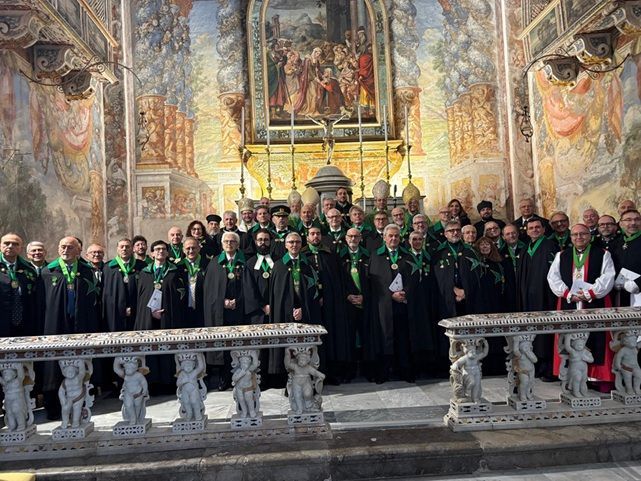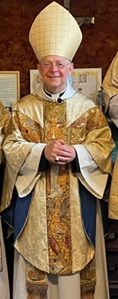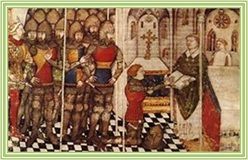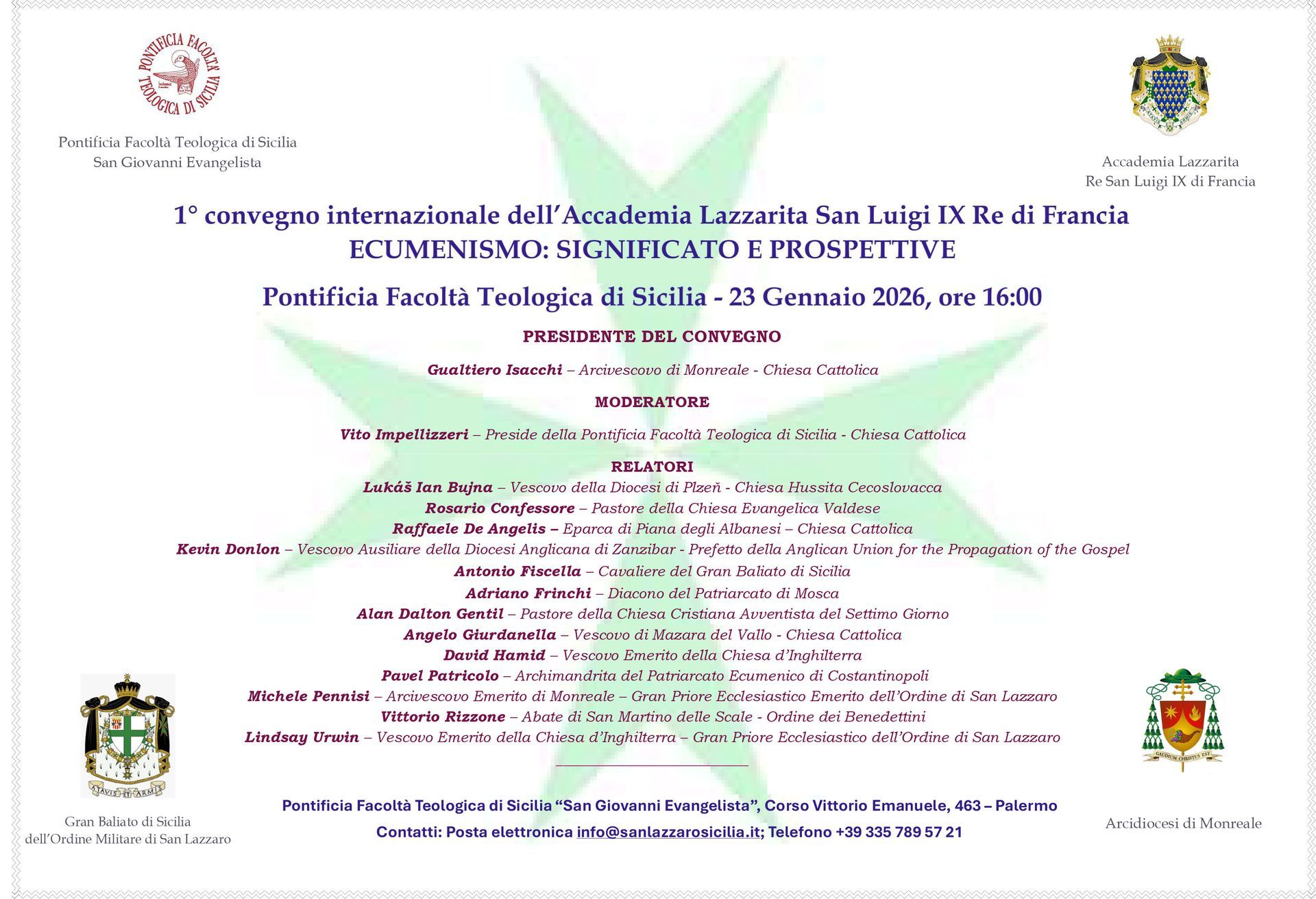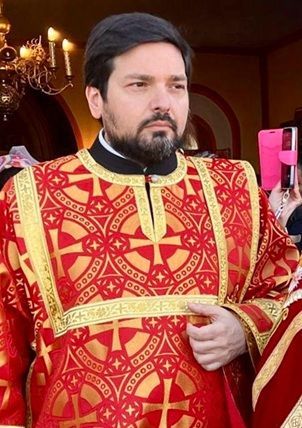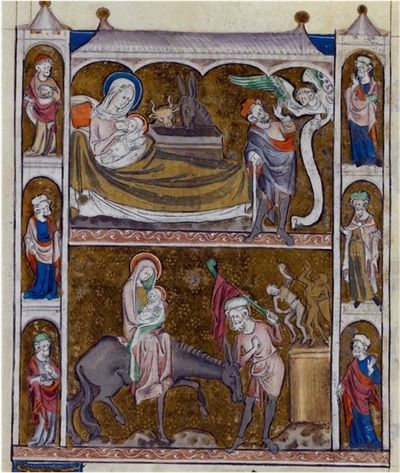MEDITAZIONE PER LA DOMENICA DELLE PALME DI MONS. GUALIERO ISACCHI, ECLJ CAPPELLANO MAGGIORE DEL GRAN BALIATO DI SICILIA
MEDITAZIONE PER LA DOMENICA DELLE PALME DI MONS. GUALIERO ISACCHI, ECLJ CAPPELLANO MAGGIORE DEL GRAN BALIATO DI SICILIA
(L'entrata di Gesù Cristo in Gerusalemme; mosaico bizantino XII sec. della Cappella Palatina del Palazzo Reale, o dei Normanni, a Palermo)
Carissimi confratelli dell’Ordine di San Lazzaro, con piacere condivido con voi qualche pensiero e qualche suggerimento che possa essere di aiuto nel penetrare il significato profondo della Domenica delle Palme come celebrazione introitale alla grande Settimana Santa.
Lo faccio in due momenti: anzitutto osserveremo cosa fa Gesù, per comprendere come sceglie di entrare nella città Santa consapevole che lì è chiamato a donare tutto sé stesso; in secondo luogo ci domanderemo, noi cosa dobbiamo fare? Come dobbiamo entrare in questo Tempo santo?
La Domenica delle Palme
La benedizione delle palme, da cui questa domenica prende il nome, è il rito con il quale si dà avvio ad una processione che i fedeli precorrono sventolando rami di ulivo per evocare il solenne ingresso in Gerusalemme di Gesù, con la folla che gli va incontro festosa e acclamante. Il vangelo di Marco (11,1-10), come il vangelo di Giovanni (12,12-16) a cui farò riferimento, che vengono proposti dalla liturgia prima della benedizione delle palme, ci ricordano come si svolse quell’evento solenne che vivremo insieme prima della celebrazione della santa Messa.
Come tutti i segni liturgici, anche questo corteo festante, non è fine a sé stesso, non vuole semplicemente farci prendere in mano le palme, gli ulivi, per compiere qualche passo cantando, ma intende farci esprimere, piuttosto, la volontà di iniziare un cammino. Questa scena infatti, che vorrebbe essere di entusiasmo, non ha valori in sé: assume piuttosto il suo significato nell'insieme degli eventi successivi che culmineranno nella morte e nella risurrezione di Gesù. Contiene perciò una domanda che è anche un invito: vuoi tu muovere i tuoi passi entrando con Gesù a Gerusalemme fino al calvario? Vuoi vedere dove finiscono i passi del tuo Dio, vuoi essere con lui là dove lui è? Solo così sarà tua la gioia di Pasqua.
Entriamo dunque con la Domenica delle Palme nella Settimana Santa, chiamata anche “autentica” o “grande”. Grande perché, come dice San Giovanni Crisostomo, «in essa si sono verificati per noi beni ineffabili: si è conclusa la lunga guerra, è stata estinta la morte, cancellata la maledizione, rimossa ogni barriera, soppressa la schiavitù del peccato. In essa il Dio della Pace ha pacificato ogni cosa, sia in cielo che in terra». Che bello ascoltare questa espressione: “si è conclusa la grande guerra” … come sarebbe bello poterla pronunciare in questo nostro tempo parlando a proposito dei tanti conflitti armati che insanguinano i diversi continenti.
Domandiamo, in questi giorni santi, il dono della Pace. Chiediamo che il Signore susciti nel cuore dei responsabili delle nazioni sentimenti di riconciliazione, aspirazioni di dialogo e incontro, rifiuto di ogni conflitto e contrapposizione. Preghiamo particolarmente, accogliendo l’invito del nostro Papa Francesco, per la pace nel conflitto israelo-palestinese e in quello russo-ucraino. Mentre preghiamo per questa intenzione, interroghiamoci pure sulle condizioni profonde per attuare una reale pace nel mondo intero.
La liturgia della Domenica delle Palme è, quindi, un preludio alla Pasqua del Signore.
L'entrata in Gerusalemme dà il via all’ora di Cristo, l'ora verso la quale tende tutta la sua vita, l'ora che è al centro della storia del mondo. Con queste parole l’evangelista Giovanni introduce i racconti della Passione di Gesù: «Prima della festa di Pasqua Gesù, sapendo che era venuta la sua ora» (Gv 13,1), ma prima ancora lo stesso evangelista racconta quanto Gesù stesso ha detto ai Greci che, avendo saputo della sua presenza in città, chiedono di vederlo: «è venuta l'ora in cui sarà glorificato il figlio dell'uomo» (Gv 12,23), gloria che risplenderà pienamente quando dalla Croce attirerà tutti a sé.
Cosa fa Gesù
Il vangelo di Giovanni ci racconta che cosa fa Gesù quando la folla gli va incontro gridando: «Osanna! Benedetto colui che viene nel nome del Signore, il re d'Israele!» (12,13). Gesù non parla, non dice nulla, pone soltanto un gesto simbolico, ricco di significato: trova un asino e vi monta sopra. L'evangelista Giovanni annota: «come sta scritto: non temere, figlia di Sion! Ecco, il tuo re viene, seduto su un puledro d'asina» (12,15b). L'asino era l'animale mite che anche i primi re di Israele, Davide e Salomone, cavalcavano in tempo di pace, contrapposto al destriero e al cocchio utilizzati nei tempi di guerra. Gesù pone, quindi, un gesto semplicissimo per indicare la sua scelta di servire in modo umile e benevolo.
Questo di Gesù è il primo di una serie di gesti inediti, fuori dall'aspettativa della gente, che contempleremo nei giorni della settimana Santa: gesti di pazienza, di passività di fronte ai suoi persecutori, di silenzio, di oblio che neppure gli apostoli capiranno. Anche a noi conviene entrare con molta umiltà nelle celebrazioni della Settimana Santa, non diamo per scontato il sapere cosa accadrà. La folla che ha osannato Gesù nel suo ingresso nella città Santa è la stessa che il venerdì successivo grida: crocifiggilo! I gesti compiuti da Gesù hanno disorientato la fede “certa” del popolo che è stato incapace di riconoscere in un crocifisso il Dio della vita.
Proviamo a contemplare Gesù in questo modo: mettendoci nel suo cuore quando, arrivando a Gerusalemme, sa di andare incontro alla morte e quindi tiene gli occhi fissi sul Padre, nell'unico desiderio di compiere fino in fondo la sua volontà, di adempiere le Scritture, di portare a termine, a prezzo della vita, la missione affidatagli di salvare l'umanità, di liberare il mondo dal peccato, dal male, dalla violenza, dall’odio.
La folla acclama Gesù come re perché, avendo saputo della risurrezione di Lazzaro, gli corre incontro nella speranza che possa liberare Israele dall'oppressione politica. Gesù permette questa manifestazione gioiosa perché ha compassione di quella gente buona e semplice, amareggiata e appesantita da una vita faticosa e vuole aprire, in loro, un orizzonte di speranza.
Gesù entra nella città per offrirle l'Alleanza definitiva, per assicurarle che Dio la ama come una figlia per questo esclama: «Non temere figlia Sion!» (Gv 12, 15a). Per Gesù la città non è una realtà estranea, insignificante, dura di cuore, bensì una creatura da curare con pazienza e amabilità, nello stesso modo in cui ci si prende cura di una figlia. È questo il modo in cui, ancora oggi, Gesù entra nelle nostre città: con benevolenza, fiducia, affetto, cura. E lo fa per darci vita e non per condannarci. Il suo amore è come un roveto ardente che brucia e non si consuma (cf. Es 3). Questo fa Gesù.
Il ricordo dell’ingresso di Gesù in Gerusalemme è, per noi, anche un invito a lasciare che il suo mistero di amore e di mitezza entri nella nostra vita orientando le nostre azioni e le nostre scelte.
Noi, cosa dobbiamo fare?
Alla luce di cosa fa Gesù, ci domandiamo: che cosa in concreto dobbiamo fare noi nei prossimi giorni?
La domanda lascia spazio, certamente, ad una risposta personale di ciascuno, ma credo che almeno tre passi li dobbiamo compiere tutti insieme.
- Anzitutto siamo invitati a partecipare a tutti i riti della Settimana Santa che hanno lo scopo di coinvolgerci profondamente, giorno dopo giorno, negli avvenimenti che hanno segnato l'ultimo scorcio della vita di Gesù e di stimolarci a una comunione intima con i sentimenti da lui vissuti.
- Siamo pure invitati ad accostarci al sacramento della Riconciliazione in modo che il nostro cuore sia purificato, pronto ad aprirsi al dono dell'Alleanza pasquale e dell’umanità nuova. Un’umanità che diventa fonte di gioia per la città e si mette al servizio della pace, della giustizia e della verità.
- Ma c'è qualcosa di più che siamo chiamati a fare. All’inizio dicevo che i giorni della Settimana Santa saranno per noi un tempo di preghiera per la pace, ma anche occasione per interrogarci su quali sono le condizioni profonde per attuare una reale pace nel mondo intero. Questo secondo impegno non è per noi opzionale, è insito nella nostra natura di battezzati. Nelle beatitudini Gesù proclama: «Beati gli operatori di pace, perché saranno chiamati figli di Dio» (Mt 5,9). Invertendo i termini, il significato mi pare appaia ancora più chiaro: se vuoi essere figlio di Dio, devi farti operatore di pace.
Si tratta di un impegno che inizia con un lavoro su sé stessi, sul proprio cuore e nell’ambiente in cui si vive. Il primo passo per vivere da figli di Dio e, quindi, il farci costruttori di pace accogliendo la consegna che Gesù lascia ai suoi discepoli nell’ultima cena dopo aver loro lavato i piedi: «Vi ho dato un esempio, infatti, perché anche voi facciate come io ho fatto a voi» (Gv 13,15). Per essere costruttori di pace dobbiamo farci servi gli uni degli altri.
Infine, il secondo passo per essere figli di Dio e quello di riconoscerci fratelli e sorelle tra di noi, proprio perché figli dello stesso Padre. La soluzione di ogni confluito tra gruppi e mentalità diverse, all'interno della Chiesa, delle città, delle famiglie e nel mondo, si trova nel comportamento di Cristo che ha accolto tutti facendosi servo di tutti per radunarci in un’unica grande famiglia di fratelli, figli dell’unico Padre. Egli è venuto nel mondo proprio per accogliere Israele e tutti i popoli della terra nel Regno di Dio. Vivere da cristiani significa allora vivere accogliendoci nell'amore vicendevole, significa prepararsi alla Pasqua avendo nel cuore o ritrovando questi sentimenti. La nostra appartenenza al popolo di Dio non è un privilegio che ci separa dagli altri, bensì una sorgente di responsabilità nei confronti di tutti gli uomini che dobbiamo indistintamente accogliere come fratelli.
Vorrei concludere facendo mie le parole di San Paolo: «Il Dio della speranza vi riempia, nel credere, di ogni gioia e pace, perché abbondiate nella speranza per la virtù dello Spirito Santo» (Rm 15,13). È un augurio che rivolgo a tutti voi, alle vostre famiglie e che vorrei rilanciassimo a tutto il mondo. Gioia e pace nella fede non sono conciliabili con le discordie e le divisioni, sono un dono che ci apre al futuro di Dio, futuro pieno di speranza fondata sulla potenza dello Spirito.
È questa la speranza di cui abbiamo bisogno e che ci sarà elargita abbondantemente se vivremo i misteri celebrati nella Settimana Santa con devozione e coinvolgimento.
Chiediamo il dono della gioia e pace nella fede che prelude e ci avvicina alla luce sfolgorante della Pasqua.
+ Gualtiero Isacchi, Arcivescovo di Monreale e Cappellano Maggiore del Gran Baliato di Sicilia
MEDITATION FOR PALM SUNDAY BY MONS. GUALIERO ISACCHI, ECLJ MAJOR CHAPLAIN OF THE GRAND BALIATE OF SICILY
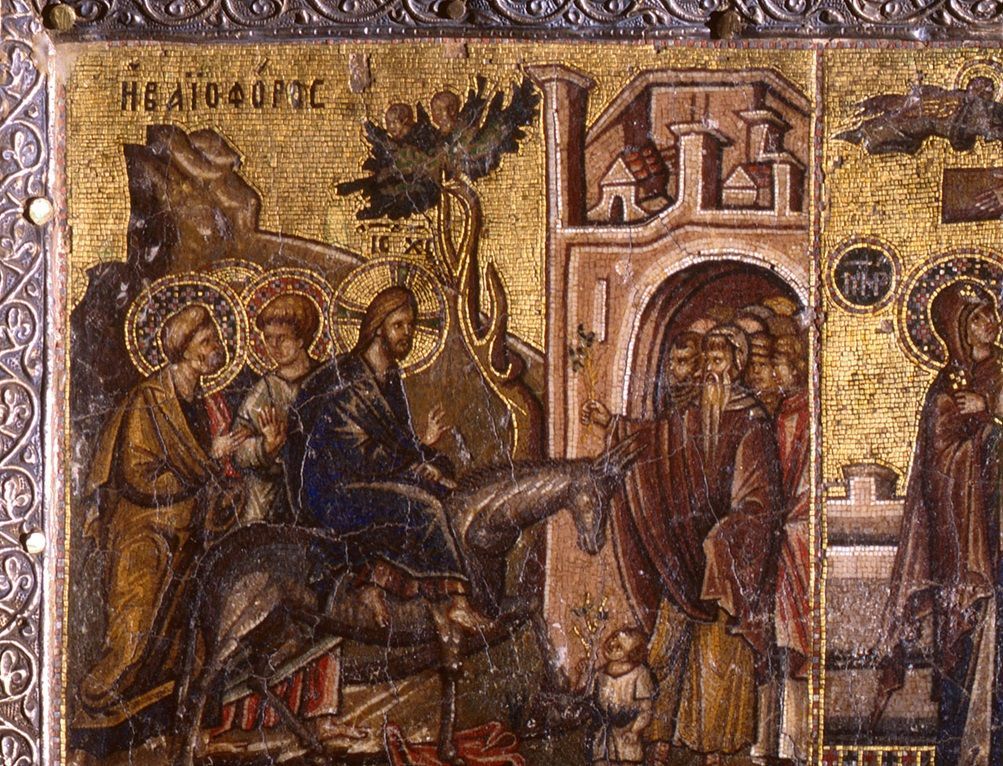
(Entrata di Cristo in Gerusalemme - decorazione musiva - manifattura bizantina, Firenze, inizio sec. XIV)
Dear confreres of the Order of St. Lazarus, with pleasure I share with you some thoughts and suggestions that may be of help in penetrating the deep meaning of Palm Sunday as an introductory celebration to the great Holy Week.
I do this in two moments: first, we will observe what Jesus does, to understand how he chooses to enter the Holy City aware that there he is called to give all of himself; second, we will ask ourselves, what are we to do? How should we enter this Holy Time?
Palm Sunday
The Blessing of the Palms, from which this Sunday takes its name, is the rite by which a procession is initiated that the faithful pre-empt by waving olive branches to evoke Jesus' solemn entry into Jerusalem, with the crowds going to meet him festively and acclaimingly. Mark's gospel (11:1-10), like John's gospel (12:12-16) to which I will refer, which are offered by the liturgy before the blessing of the palms, remind us of how that solemn event took place that we will experience together before the celebration of holy Mass.
Like all liturgical signs, this festive procession, too, is not an end in itself; it is not meant simply to make us take hold of the palms, the olive trees, to take a few steps while singing, but is intended to make us express, rather, the will to begin a journey. In fact, this scene, which is meant to be one of enthusiasm, has no values in itself: rather, it takes on its meaning in the set of subsequent events that will culminate in Jesus' death and resurrection. It therefore contains a question that is also an invitation: do you want to move your steps by entering with Jesus in Jerusalem to Calvary? Do you want to see where your God's steps end, do you want to be with him there where he is? Only then will the joy of Easter be yours.
So we enter with Palm Sunday into Holy Week, also called "authentic" or "great." Great because, as St. John Chrysostom says, "in it ineffable goods have occurred for us: the long war has ended, death has been extinguished, the curse erased, every barrier removed, the bondage of sin suppressed. In it the God of Peace has pacified all things, both in heaven and on earth." How good it would be to hear this expression, "the great war has ended" ... how good it would be to be able to pronounce it in this our time speaking in regard to the many armed conflicts that stain the different continents with blood.
We ask, on these holy days, for the gift of Peace. We ask the Lord to stir in the hearts of the leaders of nations feelings of reconciliation, aspirations for dialogue and encounter, rejection of all conflict and opposition. We pray especially, accepting the invitation of our Pope Francis, for peace in the Israeli-Palestinian and Russian-Ukrainian conflicts. While we pray for this intention, let us also ask ourselves about the deep conditions for implementing real peace in the whole world.
The liturgy of Palm Sunday is, therefore, a prelude to the Lord's Passover.
The entry into Jerusalem kicks off the hour of Christ, the hour toward which his whole life tends, the hour that is at the center of world history. With these words the evangelist John introduces the accounts of Jesus' Passion: "Before the Passover feast Jesus knew that his hour had come" (Jn. 13:1), but before that the same evangelist recounts what Jesus himself said to the Greeks who, having learned of his presence in the city, asked to see him: "the hour has come in which the son of man will be glorified" (Jn. 12:23), a glory that will shine forth fully when from the Cross he draws all to himself.
What Jesus does
John's gospel tells us what Jesus does when the crowd comes to him shouting, "Hosanna! Blessed is he who comes in the name of the Lord, the king of Israel!"(12:13). Jesus does not speak, says nothing, poses only a symbolic gesture, rich in meaning: he finds a donkey and mounts on it. The evangelist John notes, "As it is written, Fear not, daughter of Zion! Behold, your king comes, sitting on a donkey's colt" (12:15b). The donkey was the meek animal that even the first kings of Israel, David and Solomon, rode in times of peace, as opposed to the steed and chariot used in times of war. Jesus poses, then, a very simple gesture to indicate his choice to serve in a humble and benevolent way.
This of Jesus is the first of a series of unprecedented gestures, out of people's expectation, that we will contemplate in the days of Holy Week: gestures of patience, of passivity in the face of his persecutors, of silence, of oblivion that even the apostles will not understand. We too should enter the celebrations of Holy Week with great humility; let us not take for granted knowing what will happen. The crowd that hailed Jesus on his entry into the Holy City is the same crowd that on the following Friday cries out: crucify him! The gestures made by Jesus disoriented the "certain" faith of the people who were unable to recognize in a crucified man the God of life.
Let us try to contemplate Jesus in this way: by putting ourselves in his heart when, arriving in Jerusalem, he knows that he is going to meet death and therefore keeps his eyes fixed on the Father, in the sole desire to fulfill his will to the end, to fulfill the Scriptures, to carry out, at the cost of his life, the mission entrusted to him to save humanity, to free the world from sin, evil, violence, and hatred.
The crowd hails Jesus as king because, having heard of Lazarus' resurrection, they run to him in the hope that he will deliver Israel from political oppression. Jesus allows this joyful display because he has compassion on those good and simple people, embittered and weighed down by a strenuous life and wants to open, in them, a horizon of hope.
Jesus enters the city to offer it the ultimate Covenant, to assure it that God loves it as a daughter for that reason he exclaims, "Fear not daughter Zion!" (Jn. 12:15a). For Jesus, the city is not a foreign, insignificant, hard-hearted reality, but rather a creature to be cared for with patience and lovingkindness, in the same way one cares for a daughter. This is the way, even today, Jesus enters our cities: with benevolence, trust, affection, care. And he does it to give us life and not to condemn us. His love is like a burning bush that burns and is not consumed (cf. Ex. 3). This is what Jesus does.
The remembrance of Jesus' entry into Jerusalem is, for us, also an invitation to let his mystery of love and meekness enter our lives by directing our actions and choices.
We, what are we to do?
In light of what Jesus does, we ask ourselves: what specifically are we to do in the coming days?
The question leaves room, certainly, for a personal response from each person, but I believe that at least three steps we must all take together.
- First of all, we are invited to participate in all the rites of Holy Week that are meant to involve us deeply, day after day, in the events that marked the last part of Jesus' life and to stimulate us to intimate communion with the feelings he experienced.
- We are also invited to approach the Sacrament of Reconciliation so that our hearts may be purified, ready to open to the gift of the Paschal Covenant and new humanity. A humanity that becomes a source of joy for the city and puts itself at the service of peace, justice and truth.
- But there is something more we are called to do. I said at the beginning that the days of Holy Week will be a time of prayer for peace for us, but also an opportunity to ask ourselves what are the deep conditions for implementing real peace in the whole world. This second commitment is not optional for us; it is inherent in our nature as baptized people. In the beatitudes Jesus proclaims, "Blessed are the peacemakers, for they will be called children of God" (Mt. 5:9). By reversing the terms, the meaning seems to me to appear even clearer: if you want to be a child of God, you must become a peacemaker.
This is a commitment that begins with work on oneself, on one's heart and in one's environment. The first step in living as children of God is, therefore, making ourselves peacemakers by accepting the delivery Jesus leaves to his disciples at the Last Supper after washing their feet: "For I have given you an example, that you also should do as I have done to you" (Jn. 13:15). To be peacemakers, we must be servants to one another.
Finally, the second step to being children of God is to recognize ourselves as brothers and sisters among ourselves, precisely because we are children of the same Father. The solution to every confluence between different groups and mentalities, within the Church, cities, families and in the world, is found in the behavior of Christ who welcomed all by making himself the servant of all to gather us into one big family of brothers and sisters, children of the one Father. He came into the world precisely to welcome Israel and all the peoples of the earth into the Kingdom of God. Living as Christians then means living by welcoming one another in mutual love; it means preparing for Easter by having these feelings in our hearts or finding them again. Our belonging to God's people is not a privilege that separates us from others, but rather a source of responsibility to all people whom we must indiscriminately welcome as brothers and sisters.
I would like to conclude by making my own the words of St. Paul: "May the God of hope fill you, in believing, with all joy and peace, that you may abound in hope by the virtue of the Holy Spirit" (Rom. 15:13). It is a wish that I extend to all of you, to your families, and that I would like to relay to the whole world. Joy and peace in faith are not reconcilable with discord and division; they are a gift that opens us to God's future, a future full of hope based on the power of the Spirit.
This is the hope we need and will be bestowed upon us abundantly if we live the mysteries celebrated in Holy Week with devotion and involvement.
Let us ask for the gift of joy and peace in the faith that preludes and brings us closer to the blazing light of Easter.
+ Gualtiero Isacchi, Archbishop of Monreale and Major Chaplain of the Grand Bailiwick of Sicily

